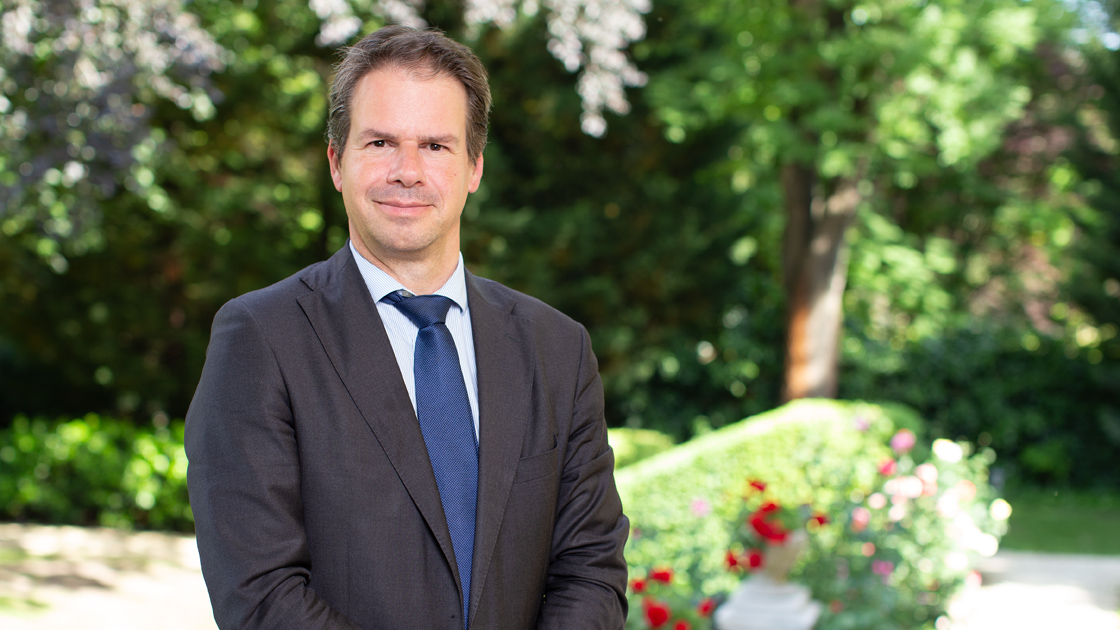France is an important economic partner to Hungary and the fifth largest investor in this country, with almost 50,000 people working for French companies here. In an extensive interview with Diplomacy&Trade, French Ambassador Jonathan Lacôte, who is quite familiar with this country, also discusses the importance of keeping a very strong political dialogue with Hungary and that of human contacts through culture and tourism.
This is not the first time Jonathan Lacôte, who presented his credentials in this country last September, serves at the French embassy in Budapest, he even learned some Hungarian before. He tells Diplomacy&Trade that “it's been a long story between Hungary and me, or me and Hungary. Actually, I was very much marked by the events of 1989, a year when France was celebrating the bicentenary of the revolution but other developments were also going on in East Central Europe. I very vividly remember the human chain across the Baltics on August 23, on the 50th anniversary of the Ribbentrop-Molotov Pact. And I do remember on October 23 Hungary being proclaimed a republic here in Kossuth Square in downtown Budapest with the previous regime being sent back to history. So, there was a strong dynamic going on this year, with the fall of the Berlin Wall, the Romanian Revolution and all the other developments. So, I was very much interested in this region as a whole. I also remember the Pan-European Picnic breaching the Iron Curtain as Hungary was always ahead in democratization in the region and then was a front runner in the EU accession process.
In 1993, he decided by mere curiosity to come here as a trainee at the French Embassy. "It was a very short stay actually, not more than two months, but enough for me to catch a ‘virus’ here in this country, including appetite to learn the language, read most of the Hungarian literature translated into French, watch most of the Hungarian movies available on DVDs and I am quite familiar with the country. Even though I was posted as a diplomat later on in Serbia and in Montenegro, I never lost contact with Hungary. This may have played a role in my appointment as ambassador here, but it is a great opportunity. So, I'm happy each time I travel to a city to say to the mayor that it is not exactly my first time in the city that I had already been there 30, 25 or 20 or 15 years ago. But nevertheless, I think that being appointed as ambassador in a country is always in a certain way starting from zero. We need to have a full vision of the bilateral relations in all its dimensions and that's something I wasn't necessarily acquainted with. It is important to look to the future. Yes, I remember the French Institute when it was brand new 30 years ago. Now, I want to work on what it will be like in 30 years when the building will be celebrating its 60th birthday. And I think this is an important dimension of my mission here is not to be drowned in everyday politics in a country, which produces lots of internal politics, arguments, debates, etc. It's to work on the bilateral relation between our two countries and to look at how this relation will develop in the long term.”
Long-standing partners and allies
The Ambassador stresses that it is a strong cement between the two countries to have long been partners in the EU and allies in NATO but this also leaves room for a strictly bilateral relation. Between 1989, even before, and the moment Hungary became member of NATO and then that of the European Union, the two countries built a strong relationship with strong instruments like cultural institutes in respective cities. Many French companies came to this country before it became member of the European Union. He is of the view that the bilateral ties have several pillars, which are important for both countries. Cooperation in the field of energy, and notably nuclear energy, is one of these because a number of French companies are involved in the development of nuclear energy in this country, be it on fuel, be it on construction of the new plant, be it on treatment of nuclear waste.
Another pillar would be defense. “We do have strong defense cooperation with Hungary, including contracts in the field of armament, and we do have other pillars, like agriculture where the two countries are exactly on the same line when it comes to protecting the common agricultural policy, when it comes to trade agreements with other parties and more generally speaking, importance given to agriculture, food security and food sovereignty. Also, we are two countries that give strong importance to culture, to the cultural identity, to the protection of cultural goods, countries in which books are important, where independent cinema, nationally produced cinema is important, where architectural heritage is important. For us, French Embassy, there is a Hungarian audience to go that we must reach to. We have to look beyond Budapest because Budapest is not Hungary, Hungary is not Budapest,” he adds.
Keeping up strong political dialogue
One important step in bilateral relations was this spring when President Macron received Prime Minister Orbán in Paris. Talks were dominated by issues of European security, the Russian aggression in Ukraine on which the Hungarian government has a stance different from France and most of the EU countries. However, as Ambassador Lacôte notes, that meeting was one among many others. “Since I arrived last summer, they actually met three times, not to mention the number of times they have seen each other in Brussels during EU meeting. Indeed, because we are partners in EU and allies in NATO, we consider that we must talk about every single topic and precisely those topics on which we are not totally in agreement – the perception of the ongoing conflict in Ukraine is one of them. The expression 'camp of the peace' is very much used in Hungary. I think there is no doubt that France is in the camp of peace, just that we may have a different approach, considering that if there is no peace today, it is mainly because somebody in Moscow does not want this peace. So, we are just as supportive as Hungary may be to the efforts made by President Trump to bring the two parties to the same table. But what we see is that one party is less eager to enter negotiations for a ceasefire and then for a long-lasting peace than the other. Until we have this situation, France will be very much in support of Ukraine: military support, but also support for its internal reforms and long-term perspective of accession to the EU. It is precisely these topics that the French President and the Hungarian Prime Minister discuss when they meet, and our belief is that it is precisely useful to talk to those who don't necessarily agree with you, and this is a choice made by France to keep a very strong political dialogue with Hungary.”
Long-standing economic presence
French companies make up a large investor community in Hungary. Indeed, France is the fifth largest investor in Hungary, almost 50,000 people work for French companies in this country. The Ambassador emphasizes that the main characteristic of the French companies is that they have become Hungarian and local. “I think almost 98% of the employees are Hungarian and the management of these French branches here in Hungary are also Hungarian. These have been long-term investments, some of them made over 30 years ago. Another characteristic of the French economic presence in Hungary is that we are present in every sphere very much like the French market itself. We have, of course, retail trade, pharmaceuticals with several companies involved and production sites in Hungary as well as research and development, so with high added value. Budapest’s main airport, owned by the government, is now run by a French company. During the last months, I have visited very diverse French companies in Hungary, be it food processing firm, including cheese, be it fabrication of ceramics, plates, very high standards with very high added value, be it luxury equipment for very famous foreign car brands and it's a source of satisfaction that French companies are present in these various sectors. Of course, they are very sensitive to the evolution of the local economic situation, of the local market and also of the government regulations.”
The Embassy is always in very close contact with the French companies here so that they can operate in the best conditions and, if necessary, have access to the Hungarian government to put their points forward. As to what impressions he has had when talking to French firms here, Ambassador Lacôte says that “the economic environment is tough for everybody. It is not only about the Hungarian environment, it is the regional environment, the international environment with now threats of tariffs by the Trump administration. Our role as embassy is to help these companies mediate with the government if they feel that certain regulations create difficulties for them to operate in good conditions. My impression, through the French Chamber of Commerce in Hungary, which has more than 500 members, is that French companies are happy to operate in Hungary – and it better be so because the market is extremely competitive. I think the advantages of Hungary are its geographical position and the quality of the workforce.”
Culture and human contacts
Cultural relations between the two countries date back many centuries. This is an important sphere for the Embassy as they encounter a very receptive Hungarian audience. “We are two countries that cherish culture, history, traditions as well as creativity. So, in this field, we do speak the same language. We have, I would say, multi-faceted cultural activity here. One of the biggest French institutes in Europe is in Budapest, promoting activities outside its own walls as well. For instance, the Comédie Française recently performed in the National Theater. We pay a great attention, as I mentioned, to having activities outside of Budapest. This March, we had the month of the Francophonie – whereas in other countries, you have a week, or a day, of the Francophonie – and we paid great attention that the majority of the events that we organize with other partner embassies and with many Hungarian partner institutions, be organized outside the capital,” the Ambassador states.
He adds that when they promote French culture, French language, Francophonie in general, they very often do it with Hungarian partners. “The Opera was kind enough to play Faust by Gounod on the day of Francophonie, there were many other events promoted by very important state, municipal and independent institutions of culture. As I said, our objective is to reach out precisely to those Hungarians who don't have a personal history with France. We have very long cultural history connections. So many Hungarian artists, writers, poets – like Attila József or Endre Ady – lived in Paris, they all have memorial plaques in the streets there. I believe it's important to look at these chapters of our common history, which, especially in the first half of the 20th century, was not that easy. All that radically changed after 1956, when Hungary became very popular in France, and then, 1989 also has an influence on the positive image of Hungary – we have to capitalize on this.”
He mentions that very recently, he visited a museum in Balatonboglár, which holds the memory of French soldiers who escaped from German camps in WWII and were warmly welcomed in Hungary, found shelters, even found families and had a very safe life. He believes it is important to focus also on these very positive chapters that have existed between the two countries. “Hungarians welcoming the French during World War II, and then French welcoming quite a number of Hungarians after 1956, this would generate very strong cultural ties. For instance, we pay a great effort to translating French books, be it literature or be it human sciences, into Hungarian, several dozen every year. We call it the Kosztolányi program because Hungarian poet Dezső Kosztolányi was a great translator from French to Hungarian and I can testify as a reader that there are so many books, also translated from Hungarian to French and very successful with the French audience, be it Sándor Márai, Magda Szabó, Imre Kertész, László Krasznahorkai and all these names which are also very famous in Hungary. So, culture is far from something peripherical. It's something absolutely central in the bilateral relation, it is also about connecting people. Tourism is another important source. Half a million French tourists visit Hungary every year. This plays a huge role in making the country more familiar for the French audience. More than 300,000 Hungarians also visited France last year and the trend this year is very positive. So, all this goes down to human contacts between the two peoples. I always say that the Embassy does not have the monopoly of bilateral relations, far from that. We are now in a situation where our role is to facilitate other players to be in contact in the current context. This works from the highest level where our leaders meet on a very regular basis to the ordinary people who are eager to discover the country of the other.”


Leave a Reply Cancel reply
Top 5 Articles
 Shaping a Generation of Creative and Resilient… September 10, 2025
Shaping a Generation of Creative and Resilient… September 10, 2025  For the Export Success of Hungarian Enterprises June 17, 2025
For the Export Success of Hungarian Enterprises June 17, 2025  MEPs call for EU court action after Hungary passes… April 18, 2025
MEPs call for EU court action after Hungary passes… April 18, 2025  Hungary Rejects Calls to Cease Russian Oil Imports September 26, 2025
Hungary Rejects Calls to Cease Russian Oil Imports September 26, 2025  Hungarian Job Market Shows Strong Employee Activity… April 25, 2025
Hungarian Job Market Shows Strong Employee Activity… April 25, 2025






No comment yet. Be the first!